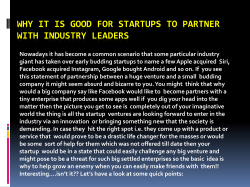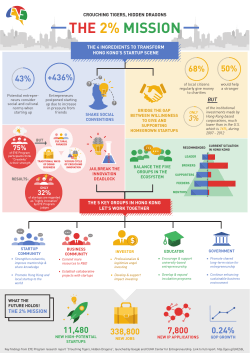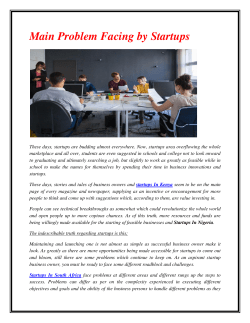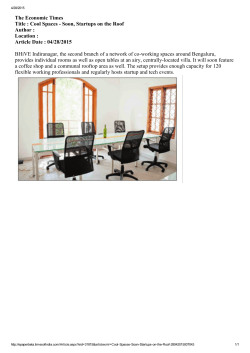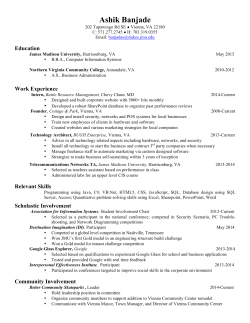
Start-ups in Austria
Austria – Attractive Launching Pad for Startups High quality of the location leads to a boom in high-tech startups The startup scene in Austria is in the midst of a vigorous and steadily intensifying boom lasting for years. In particular, the business location of Vienna has emerged as a Central European hub which is very attractive to innovative founders from Austria and abroad. They orient their products and services to global markets, and in turn gain new impetus from international investors. This dynamic development is reflected in the increasing number of startups but also in the growing proceeds realized in the exit from the incubation phase thanks to the participation of potent partners, frequently from abroad. Dynamic growth of startups The number of newly established Newly established companies in Austria: companies in Austria more than doubled 1993: 14,361 within twenty years, rising to 37,120 in 2013: 35,279 2014. Startups are defined as newly 2014: 37,120 founded companies which create Source: Vienna Economic Chamber innovative products, services or business Newly established companies in Vienna: models which did not previously exist on 2013: 8,403 the market. They pursue a clear thereof startups: 638 international perspective, boast high Share of startups: 7.6% growth potential and play an important Source: Startup Location Vienna, PGM Consulting role in the innovative strength and competitiveness of national economies. In the meantime, innovative startups comprise close to eight percent of the total of newly established companies in Vienna. The Austrian capital has also shown itself to be a dynamic startup pool in Central Europe. Lively scene of app developers The Austrian startup scene is particularly dynamic in the fields of information technologies, media and life sciences as well as in creative industries. Above all, there is a boom in startups focusing on the creation of Web platforms and mobile applications. There is a growing interest of investors. A successful exit from the incubation phase is one of the most important drivers of growth in the startup scene. The early phase financier exits from the investment and new corporate partners acquire strategic stakes. Many young companies have succeeded in achieving a valuation exceeding the million euro threshold, attracting increasing amounts of capital, especially from abroad. Young App makers ■ Shpock: Flea market app ■ Durchblicker: Rate comparison platform ■ Wikifolio: Social investment and trading platform ■ Indoo.rs: Indoor navigation ■ Zoomsquare: Real estate search engine ■ mySugr: Diabetes app ■ kochabo.at: Delivery service for food and prescriptions ■ Diagnosia: Medicine search engine for doctors From startup to global player Many innovative companies launched in Austria have attracted multinationals as partners and have emerged as global players in their technological areas. ■ Bwin: Founded in 1997 with 12 employees, the company now has a global workforce 3,100 people and is the biggest online gaming provider with annual revenue of USD 760 million. ■ Jajah: The supplier of Web-based telephony was established in 2005 and acquired by the Spanish company Telefonica in 2009 for EUR 145 million. ■ Runtastic: Launched by four students at the University of Applied Sciences Upper Austria in Hagenberg in 2009, the company with its 85 employees and more than 50 million app downloads is considered to be the worldwide market leader in mobile fitness tracking. The German Axel Springer media group has been the majority owner since 2013. ■ Paysafecard: The company was set up in 2000, and has emerged as the European market leader today with its development of the first online mean of payment approved by banking law. ■ UBIMET: Established in 2004, the two-man company is now the fastest growing private European supplier of meterological services. Red Bull has held a stake in the company since 2012. ■ AFFiRiS: The biotech startup founded in 2003 develops vaccines against Alzheimer’s, Parkinsons’s and diabetes, launching the world’s first clinical tests for a Parkinson vaccine in 2012. Six success factors for Austria as a start-up location The interaction of several factors comprises the basis for this dynamic development, giving the business location a good reputation and enhancing its attractiveness: ■ ■ ■ ■ ■ ■ The very high educational level from a technical perspective, guaranteed by the universities of technology and many universities of applied sciences. The differentiated funding system, in which financial startup assistance is provided to high-tech founders based on specific programs and startup funds implemented by the Austrian Research Promotion Agency (FFG) and Austria Wirtschaftsservice GmbH (AWS). The self-organization of the startup scene in startup clusters and coworking spaces, and its promotion through activities and large events such as the Pioneers Festival. The supporting network of early-stage investors, incubators and business angels, which has become increasingly professionalized, as shown, for example, in the founding of the Austrian Angel Investors Association (AAIA). The “public limited company with a privileged amount of share capital“, facilitating the setting up of companies by requiring only EUR 5,000 as a minimum cash contribution instead of EUR 17,500. The investment-friendly tax system featuring a twelve percent tax credit for investments in research and a unified corporate tax rate of 25 percent. 2 Hot spots of the startup scene in Austria From the Big Apple to the App center in Vienna: nextSociety The former management consultant Peter Stebe worked together with his colleagues to establish the startup nextSociety in New York to develop a networking application designed to decisively facilitate professional networking. The founders have set up their global development center in Vienna. “Vienna is building a strong startup epicenter which is not as saturated yet as in Berlin“, said Stebe in justifying the decision in favor of the Austrian business location. Back to Austria to start up a company: Lock8 His good business sense took the Viennese entrepreneur Franz Salzmann and his Mexican partner to Hungary, Germany and then the UK. However, he decided to start up the company in Vienna. His innovative product – a sensor-controlled and alarm-protected bicycle lock – promises to fundamentally change bicycle mobility. Smart phone serve as electronic keys. By using a special app the bikes can be located via GPS and conveniently booked. Science start-up: Crystalline Mirror Solutions The German-born scientist Markus Aspelmeyer of the University of Vienna developed highly precise crystal-coated mirrors in order to fulfill the highest demands of quantum physics research. These are also marketable products as demonstrated by his company Crystalline Mirror Solutions, a spin-off founded together with his American colleague Garrett Cole. The perspectives for applications range from basic research and satellite technology to the Internet infrastructure. Excellent infrastructure: Hagenberg as a biotope for startups Softwarepark Hagenberg near Linz was founded in 1989 as a spin-off of Johannes Kepler University Linz and was continuously expanded to become a model example for linking education, research and entrepreneurship. Twelve research facilities, 23 courses of study at the university and university of applied sciences level as well as 70 companies are represented in a small Austrian Silicon Valley, serving as a productive biotope for startups. Networking and international promotion: Pioneers Festival The annual Pioneers Festival launched in Vienna in 2012 is a coveted meeting place for national and international companies, investors, technology experts and pioneers in different industries to exchange information and ideas about innovative future technologies and their significance. The startup competitions comprise the heart of the Pioneers Festival. Both software and hardware startups have the opportunity to present themselves at this international platform. 3
© Copyright 2025
